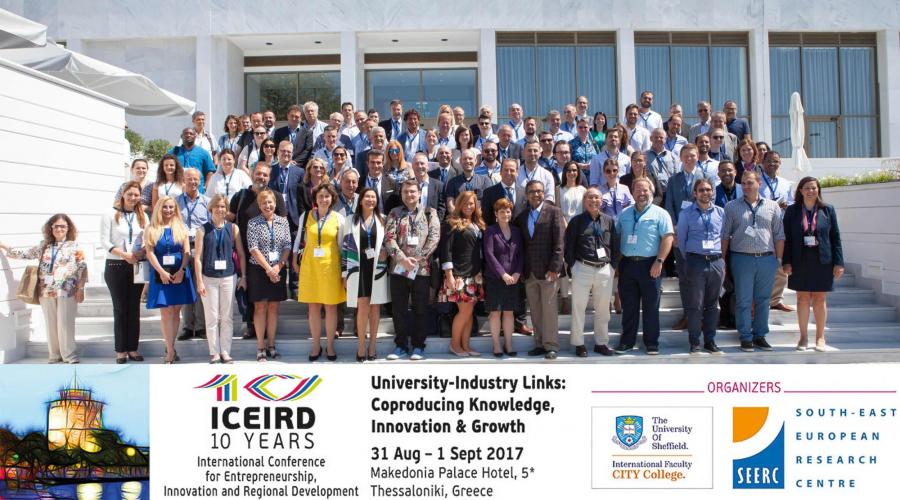
The calls for and barriers to the development of knowledge, innovation, entrepreneurship and regional development were presented at the 10th International Conference for Entrepreneurship, Innovation and Regional Development ICEIRD 2017, organized by CITY College, International Department Sheffield University and the South-East European Research Centre (SEERC) on 31st August & 1st September in Thessaloniki.
With the presence of distinguished scientists and professionals from all over the world, the active participation of 150 delegates from 31 countries, 10 specialised workshops and a round table, the conference focused on interaction between universities, industry and public administration, as well as the promotion of growth through innovation.
The central theme for 2017 was the analysis of the bond between industries and universities in the generation of knowledge, the development of innovation and economic growth. The theme was of great relevance for a number of fields, for example, the issue of the growing importance of universities in national and regional innovation systems, start-ups and connections with the scientific community, as well as the innovative potential of specific branches of the economy, such as agrifood.
The main conclusions of the conference were as follows:
- Innovation and development exists if there is close co-operation between universities (knowledge), business (markets), government and the public.
- Players constantly change the boundaries and aspirations to establish new working relationships
- It is essential for technology transfer models to incorporate the specific traits of a place rather than just follow successful global trends.
- Emerging technologies, industry 4.0 and sustainability are key modulators of innovation working together and interacting.
- There is a need to improve co-operation models between investors and startups.
- It is necessary to learn from the successful areas of the EU where smart specialisation is implemented and to study their structural changes.
- Innovation is considered to be truly successful when there are adequate resources and adroitness.
- Innovation business models can be a key tool for industries to exploit their potential to innovate and stay ahead of competition.
- Startups and Technology Transfer Offices born through research should better assimilate the open science and responsible research and innovation model.
The National Documentation Centre (EKT) not only supported the conference as a Business Partner, but also participated by giving a presentation. Nikolaos Karampekios presented the scholarly article, ‘Higher Education Institutes-Business Linkages in Greece. The Experience of Cohesion Policy 2007-2013,’ which he co-authored with Evi Sachini, Nena Malliou and Charalampos Chrysomallidis. The article refers to the broadening of the bonds and networks created between private business and research centres through cohesion programmes 2007-2013. An interesting finding which advocates the creation and continuation of such bonds is publicly funded research programmes intended to foster such institutional collaboration.
For a number of years, EKT has been an active institution in sectors which strengthen bonds between the three sides of the triangle, particularly regarding the ties between Research and Innovation, and provides the documentation required to understand the Greek research and innovation system. It is the institutional body responsible for the documentation of national scientific and research output and since 2012 has been a member of the Hellenic Statistical Authority as the competent body for the production of national statistics for research activities, development and innovation. Through the provision of processed data and indicators as well as the production of documented knowledge concerning all of the above, EKT aims to contribute to the formation of effective policies for research, technology and innovation, for the greatest positive impact on the economy and society.








